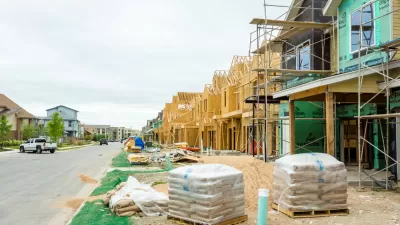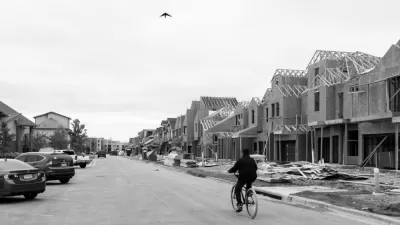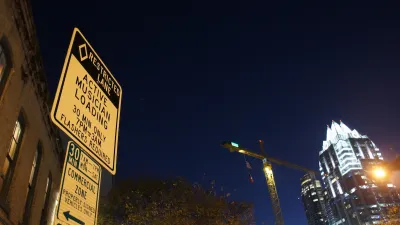Seeking to standardize what is considered an ad hoc and inconsistent approach to allowing extra density in downtown developments, Austin's city council will consider a new bonus program later this month.
As Sarah Coppola reports, "The new rules would force developers of downtown high-rises to include some affordable housing, or pay into a fund the city uses to build affordable housing elsewhere. They would then have to choose from a menu of other benefits to provide for the extra square footage they’ve received, such as sustainable features or space for a day care center."
"It is called a bonus program — do some public good, earn 'bonus' space for your project — but some downtown developers and advocacy groups worry it could function as a penalty that deters downtown’s growth."
"Developer Perry Lorenz said building tall towers comes with far greater costs and risks than building smaller buildings, including more expensive materials, complex designs and bigger insurance premiums," says Coppola. "So adding fees and rules on top of that could discourage the tall, densely packed projects that city leaders have said they want downtown, he said."
FULL STORY: Austin might seek more from developers of downtown high-rises

Americans May Be Stuck — But Why?
Americans are moving a lot less than they once did, and that is a problem. While Yoni Applebaum, in his highly-publicized article Stuck, gets the reasons badly wrong, it's still important to ask: why are we moving so much less than before?

Using Old Oil and Gas Wells for Green Energy Storage
Penn State researchers have found that repurposing abandoned oil and gas wells for geothermal-assisted compressed-air energy storage can boost efficiency, reduce environmental risks, and support clean energy and job transitions.

Placekeeping: Setting a New Precedent for City Planners
How a preservation-based approach to redevelopment and urban design can prevent displacement and honor legacy communities.

A Year-Long Investigation On Permanent Supportive Housing
The New York Times reveals what’s working and what’s not in the cornerstone of Housing First.

Survey: US Public Spaces Not Meeting Community Needs
A lack of funding prevents many U.S. parks and public spaces from playing a more significant role in helping residents meet daily needs.

San Francisco’s Muni Ridership Grew in 2024
The system saw its highest ridership since before the Covid-19 pandemic, but faces a severe budget shortage in the coming year.
Urban Design for Planners 1: Software Tools
This six-course series explores essential urban design concepts using open source software and equips planners with the tools they need to participate fully in the urban design process.
Planning for Universal Design
Learn the tools for implementing Universal Design in planning regulations.
Heyer Gruel & Associates PA
City of Moreno Valley
Institute for Housing and Urban Development Studies (IHS)
City of Grandview
Harvard GSD Executive Education
Salt Lake City
NYU Wagner Graduate School of Public Service
City of Cambridge, Maryland





























